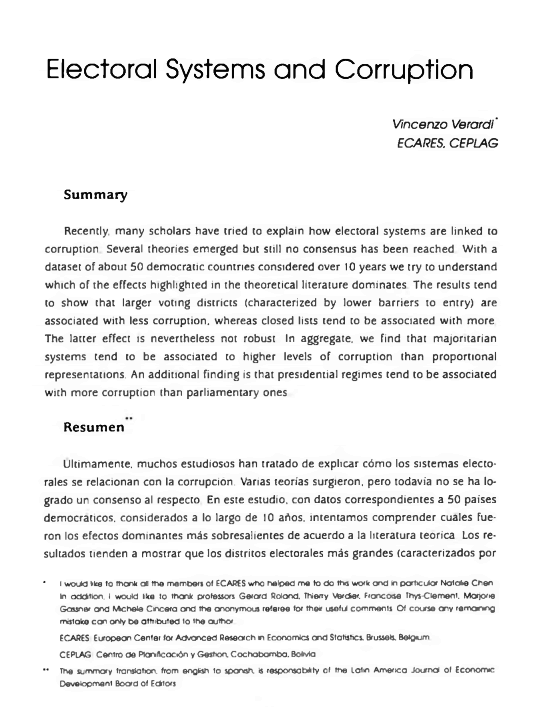Electoral Systems and Corruption
DOI:
https://doi.org/10.35319/lajed.20043303Keywords:
Electoral Systems, CorruptionAbstract
Recently, many scholars have tried to explain how electoral systems are linked to corruption Several theories emerged but still no consensus has been reached. With a dataset of about 50 democratic countries considered over 10 years we try to understand which of the effects highlighted in the theoretical literature domínales. The results tend to show that larger voting districts (characterized by lower barriers to entry) are assoclated with less corruption. Whereas closed lists tend to be associated with more. The latter effect is nevertheless not robust. In aggregate. We find that majoritarian systems tend to be associated to higher levels of corruption than proportional representations. An additional finding is that presidential regimes tend to be associated with more corruption than parliamentary ones.
Downloads
References
Ades, A. and R.Di Tella. 1999. "Rents. Competition and Corruption". American Economic Review 89: 982-993.
Alesina, A., W. Easterly and R. Baqir. 1997. "Public Goods and Ethnic divisions". Working Paper N° 6009. National Bureau o f Economic Research, NBER, Cambridge, MA.
Bardhan, P. 1997. "Corruption and Development A Review of Issues". Journal of Economic Literature XXXV, 1320-1346.
Beck, T ., G. Clarck, A. Groff, P. Keefer, and P. Walsh. 1999. "New Tools and New Tests in Comparative Political Economy: The Database of Political Institutions". Mimeo. The World Bank.
Beck, P. and M. Maher. 1986. "A Comparison of Bribery and Bidding in Thin Markets". Economic Letters, 20, 1-5.
Boycko, M., A. Shleifer and R. Vishny. 1995. Privatizing Russia. Cambridge, MA: MIT Press.
Buttler, J. and R. Moffitt. 1982. "A Computationnally Efficient Quadrature Procedure for the One Factor Multinomial Probit Model". Econometrica. 50, 761-764.
Cameron, D. 1978. "The Expansion of Public Economy A Comparative Analysis". American Political Science Review. 72, 1203-1261.
Diermeier, D. and T. Feddersen. 1998. "Cohesion in Legislatures and Vote of Confidence Procedure". American Political Science Review. 92, 611-621.
Fisman, R. and R. Gam. 1999. "Decentralisation and Corruption: Cross Country and Cross-State Evidence". Mimeo. World Bank.
Geddes, B. 1997. "The Political Uses of Corruption and Privatization". Paper prepared for presentation at the annual meeting of the APSA, Washington DC.
Jaggers, K. and T. Gurr. 1995. "Tracking Democracy's Third Wave with the Polity III Data". Journal o f Peace Research. 32, 469-482.
Kunicova, J. and S. Rose-Ackerman. 2001. "Electoral Rules as Constraints against Corruption: The Risks of Closed-Lists Proportional Representation”. Mimeo. Yale University.
La Porta, R., F. Lopez-de-Silanes, A. Shleifer and R. Vishny. 1999. "The quality of government". Journal o f Law, Economics, and Organization. 15, 222-279.
Leff, N. 1964. "Economic Development through Bureaucratic Corruption". The American Behavioural Scientist. 8(2), 8-15.
Lien, D. 1986. "A Note on Competitive Bribery Games" Economic Letters. 22, 337-341.
Lui, F. 1985. "An Equilibrium Queuing Model of Bribery". Journal o f Political Economy.93(4), 760-781.
MacMullen, R. 1988. "Corruption and the Decline of Rome". New Haven Yale.
Mauro, P. 1995. "Corruption and Growth". Quarterly Journal of Economics. 681-712.
Mauro, P. 1998. "Corruption and the Composition of Government Expenditure". Journal of Public Economics. 69, 263-279.
Milesi-Ferretti, G-M., R. Perotti, and M. Rostagno. 2000. "Electoral Systems and the Composition of Public Spending". Mimeo. Columbia University.
Myerson, R. 1993. "Effectiveness of Electoral Systems for Reducing Government Corruption: A Game Theoretic Analysis". Games and Economic Behavior. 5, 118-132.
Myerson, R. 1999. "Theoretical Comparison of Electoral Systems 1998 Schumpeter Lecture". European Economic Review. 43, 671-697.
Myrdal, G. 1968. Asian Drama: An Inquiry into the Poverty of Nations. New York: Pantheon.
Persson, T., G. Roland and G. Tabelllni. 1997. "Separation of Powers and Political Accountability". Quarterly Journal of Economics. 112, 310-327.
Persson, T., G. Tabellini, T. Persson and F. Trebbi. 2001. "Electoral Rules and Corruption". Mimeo. Bocconi University.
Riker, W. 1982. Prospect Heights. Waveland Press.
Sala-i-Martin X. 1997. "I Just Ran Four Million Regressions". NBER Working Paper N° W6252.
Schumpeter, J. 1950. Capitalism, Socialism and Democracy. New York: Harper & Borthers. (Enlarged 3rd edition).
Shugart, M. and J. Carey. 1992. Presidents and Assemblies: Constitutional Design and Electoral Dynamics. Cambridge University Press.
Treisman, D. 2000. "The Causes of Corruption a Cross-National Study". Journal of Public Economics. 76, 399-457.
Verardi, V. 2003. "The Economics of Electoral Systems". PhD Thesis. University of Brussels.
Verbeek, M. 2000. "A Guide to Modern Econometrics". John Wiley and Sons.
Wai, S-J. 1997. "How Taxing is Corruption on International Investors?". NBER Working Paper N° W6030.






